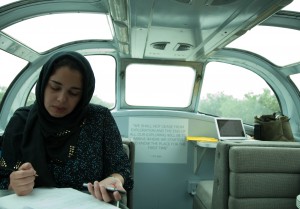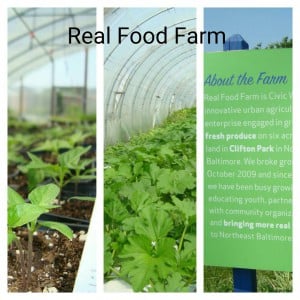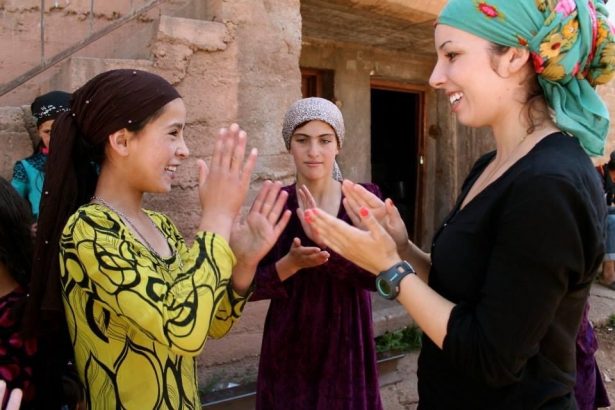Urban agriculture is a thriving industry with unlimited potential. It is not just about food, it is, first and foremost, about people and their relationship to food and the environment. My Fulbright-Millennial Trains Project journey continued to flourish while I met creative and innovative urban farmers in each city.

Fulbright Student from Iraq, Saja Al Quzweeni, on board the Millennial Trains Project
In New Orleans, I visited the New Orleans Center for Creative Arts (NOCCA). NOCCA is a regional, pre-professional arts training center that offers students intensive instruction in culinary arts, dance, media arts, music, theater arts, visual arts, and creative writing. The Culinary Arts Department offers a four-year course of study for talented students who aspire to be chefs. The Culinary Arts program was developed in collaboration with the Emeril Lagasse Foundation and is supported by Johnson & Wales University. The students are provided with the opportunity to work side by side with leading master chefs who serve as professional mentors.
NOCCA developed Press Street Gardens and Press Street Station Café to expand its Culinary Arts Department. I visited the newly developed garden and interviewed Margee Green, the manager of Press Street Gardens. She said that the produce from gardens is sold to the public, used in the café, and that the remainder goes to the culinary arts students.
The garden grows varieties of fruits and vegetables instead of a conventional mono-crop agricultural system. Food waste from the café is recycled to generate a healthy soil. The compost from this operation is used to make raised beds to plant produce instead of polluted ground soil. There is also a greenhouse to grow the seedlings before planting them directly into the soil. The garden receives volunteers who come to learn and communicate with each other. Through establishing this garden, Margee said that “we want the community to feel comfortable… because everybody deserves green space to be part of.”

Images from Baltimore’s Real Food Farm urban farming plots
I visited another site in New Orleans belonging to Rouses Supermarkets. I interviewed Elisa Mason, the manager of the hydroponics project. She explained how they grow multiple herbs in rooftop hydroponics systems and sell them in the store. The hydroponics systems are similar to garden towers which grow plants without soil. The systems are circulating water from a tank at the bottom of the tower using a pump. The systems grow herbs intensively in the tower gardens and generate generous income from selling naturally grown produce without chemicals and fertilizers. They use only organic soap to clean the plants against potential insects and diseases.
My journey with the Fulbright-Millennial Trains Project, focusing on urban agriculture culminated in Baltimore. I visited Real Food Farm in Baltimore, a nonprofit organization that works to increase food access in low-income communities. I interviewed Myeasha Taylor, Perlman Place Farm Manager. The manager gave me a tour of Perlman Place Farm and Clifton Farm where they grow produce in open fields and hoop houses. They use hoop houses to extend the growing season during winter. The organization sells its produce through farmers markets and mobile vans to neighboring communities. They also established small community gardens for older members of the community to cultivate and grow a variety of produce.
My visits to those organizations and farms made me realize that the seeds for a blossoming urban farming industry reside within people and their creative ideas. They are simple people who work hard to provide solutions to some of the most complicated problems in our world, such as food security, environmental degradation, and finite resources. Urban farming, in my view, symbolizes the integration between humans and nature. It enables communities to develop psychological and mental realities about their environment, and also connects communities to the fruits of their labor when they consume what they’ve worked hard to grow.
Check out the #Fulbright-Millennial Trains Project Storify feature for a visual representation of the journey!


No Comments